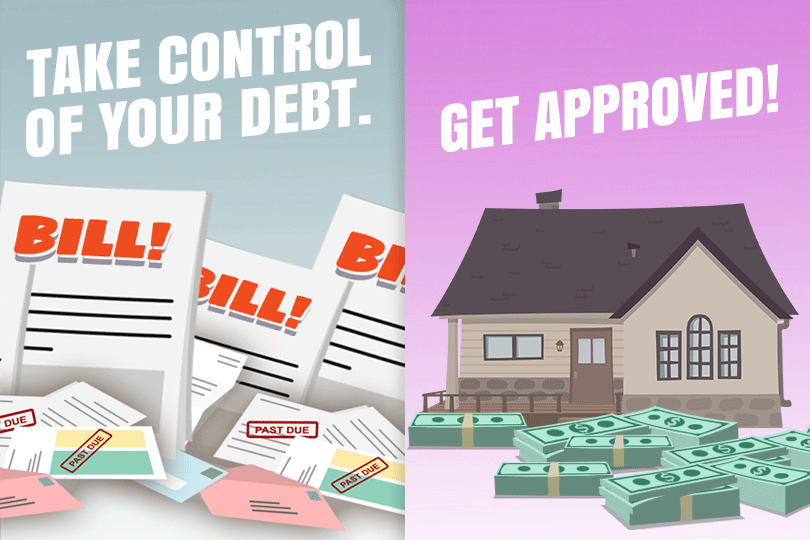Getting Approved for an FHA Loan
June 8, 2021
Credit Scores and Down Payments
The lower credit score and down payment requirement is one of the prime features that draws borrowers to apply for an FHA loan. The FHA stipulates that borrowers with a FICO score of at least 580 are eligible for the low- down payment minimum of 3.5% down payment. Those with scores between 500 and 579 must pay at least 10% for the down payment, which is still less than the usual 20% minimum for most conventional loans with no private mortgage insurance.
Mortgage Insurance Premiums
To help protect lenders from the losses in the case of borrowers defaulting on their loans, while continuing to offer high-risk borrowers flexible home loans, the FHA requires that all borrowers pay a Mortgage Insurance Premium (MIP). MIP is paid monthly, along with the monthly mortgage payments. Borrowers are also required to pay a one-time, Upfront Mortgage Insurance Premium (UFMIP) at closing, which is usually 1.75% of the loan amount. The annual MIP cost depends on the length of the loan, the loan-to-value ratio, and when the loan was originated. It’s important that borrowers know about this added cost before applying, so they don’t face any unexpected surprises later on.
Debt-to-Income Ratio
While the FHA has no minimum income requirement, it sets a maximum debt-to-income ratio to determine whether borrowers have sufficient funds to keep up with monthly payments. According to HUD Handbook 4000.1, FHA borrowers can have a “maximum qualifying ratio” 43%. This is calculated by adding up the total mortgage payment for the new home, as well as any recurring monthly debt. This includes principal and interest, escrow deposits for taxes, hazard insurance, mortgage insurance premium, as well as car loans, personal loans, student loans, credit cards, etc. That number is divided by the borrower’s gross monthly income. The result should fall under 43% to qualify for an FHA loan.
FHA Limits
The FHA has a maximum loan amount that it will insure. These limits vary by county and property type, and are updated every year based on conventional loan limits set by Fannie Mae and Freddie Mac. This limit that borrowers fall under is a huge determining factor in not just their home choice, but also if they decide to get an FHA mortgage.
Property Types
It may surprise many borrowers to learn that the FHA insures loans to purchase many different property types, and there are specific programs to suit those needs. The FHA offers Condo Loans, One-Time Construction Loans for new construction, and also Rehab Loans for fixer-uppers. The main rule to know is that any home purchased with an FHA loan must serve as the borrower’s primary residence. Investment properties are not eligible. There are exceptions for mixed-use properties, with at least 51% of the space dedicated to residence.
If you are interested in applying for an FHA loan, talk to your loan officer to see if you meet all the requirements, and figure out if it is the best option for you!
------------------------------
RELATED VIDEOS:
Understand the Reasons for Private Mortgage Insurance
Carefully Read Your Closing Disclosure
Buying a Home With a Co-Borrower

FHA Loan Articles
March 16, 2023Planning your FHA loan means asking some important questions early in the process. The most obvious question is associated with the type of home you want. How large a house do you need? FHA mortgages allow the purchase of homes with between one and four living units.
February 7, 2023There are tons of reasons why people decide that they’re done with renting and start looking into buying a home. Whatever your reason, deciding to buy a home is a big step, and one of the most daunting aspects is saving up enough money for the down payment.
January 27, 2023Before you get ready to commit to a home loan application, it’s good to review your circumstances and ask a few basic questions about your loan, your plans, and the home itself. Believe it or not, knowing what type of home loan you need is an important step.
January 10, 2023When getting ready to shop for a home loan, it's worth taking a look at your credit report. Your credit score is a big factor when lenders take a look at your loan application, and it plays a huge role in the interest rate you get.
December 23, 2022When it comes to buying a house, saving up for a down payment can be one of the most overwhelming aspects. While down payments are one of the biggest obstacles for many in the mortgage process, it helps to understand the ins and outs of why they play such a big role.







